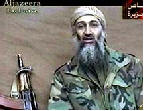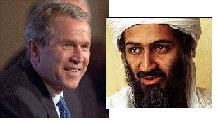 Jan/Feb/Mar 2002
Horrors take place somewhere in the world everyday. America mourns an unspeakable horror. The day began with the promise of a beautiful and clear fall morning. The kind of day that reminds one of how joyful life can be. Tuesday felt like a special day. My boss and I were discussing business when another employee entered and asked, "Did you hear anything about a plane crashing into the World Trade Center Towers?" We both said no and partially dismissed it as a rumor or unfortunate freak accident that we would learn more about later. After a radio news report shocked us into the reality of the morning, we turned on a television. In a short time we learned more than we would have ever imagined possible.
Quickly the enormity of the terror strike became evident. I prayed that the death toll would be low, that maybe somehow most of the women, children and men would make it out. I still cannot believe so many have perished. I wish I could wake myself.
I immediately began to contemplate our response. What would we do and more importantly what would it accomplish? I did not doubt that we would take military action against someone; but against whom, and with how much force? I wondered if there was a way we could find a nonviolent solution. I quickly concluded then and continue to believe that there is not a rational response that does not include a measure of violence. I say this from practical, strategic and pragmatic views. Practical in that it would be political suicide for national politicians not to respond with cries of retribution. Most politicians believe they have little choice. Strategic in that those responsible for the attacks are playing for keeps and more attempts are sure to come. Bin Laden and others like him, will not stop until they get whatever it is that they want. I, as well as most Americans expect the government to protect us and one of the answers to providing protection is to capture or kill anyone who was involved in the September 11th attack or is planning a similar action. Pragmatic in that while I believe in nonviolent approaches to change, I also believe it is unrealistic to think that socioeconomic disputes will be resolved without the threat of and or use of some force. Social change is always accompanied by violence. Nonviolent movements succeeded because the ruling parties saw the alternative, violence, as a greater threat to the maintenance of at least a semblance of the status quo than to accept the demands of the reformers. In other words those in power believed that they could maintain some of their status, prestige, etc. through nonviolent means rather than trying to repress the change at hand and loose it all. Class barriers are never shattered nor wealth opportunities redistributed without violence playing a pivotal role. I do not say this to mean that such dynamics will always be the case nor am I attempting to lay a foundation to justify violence. I do say it to infer that we as humans to this point have not developed adequate social infrastructures nor remedies for meaningful nonviolent reform to take place.
Jan/Feb/Mar 2002
Horrors take place somewhere in the world everyday. America mourns an unspeakable horror. The day began with the promise of a beautiful and clear fall morning. The kind of day that reminds one of how joyful life can be. Tuesday felt like a special day. My boss and I were discussing business when another employee entered and asked, "Did you hear anything about a plane crashing into the World Trade Center Towers?" We both said no and partially dismissed it as a rumor or unfortunate freak accident that we would learn more about later. After a radio news report shocked us into the reality of the morning, we turned on a television. In a short time we learned more than we would have ever imagined possible.
Quickly the enormity of the terror strike became evident. I prayed that the death toll would be low, that maybe somehow most of the women, children and men would make it out. I still cannot believe so many have perished. I wish I could wake myself.
I immediately began to contemplate our response. What would we do and more importantly what would it accomplish? I did not doubt that we would take military action against someone; but against whom, and with how much force? I wondered if there was a way we could find a nonviolent solution. I quickly concluded then and continue to believe that there is not a rational response that does not include a measure of violence. I say this from practical, strategic and pragmatic views. Practical in that it would be political suicide for national politicians not to respond with cries of retribution. Most politicians believe they have little choice. Strategic in that those responsible for the attacks are playing for keeps and more attempts are sure to come. Bin Laden and others like him, will not stop until they get whatever it is that they want. I, as well as most Americans expect the government to protect us and one of the answers to providing protection is to capture or kill anyone who was involved in the September 11th attack or is planning a similar action. Pragmatic in that while I believe in nonviolent approaches to change, I also believe it is unrealistic to think that socioeconomic disputes will be resolved without the threat of and or use of some force. Social change is always accompanied by violence. Nonviolent movements succeeded because the ruling parties saw the alternative, violence, as a greater threat to the maintenance of at least a semblance of the status quo than to accept the demands of the reformers. In other words those in power believed that they could maintain some of their status, prestige, etc. through nonviolent means rather than trying to repress the change at hand and loose it all. Class barriers are never shattered nor wealth opportunities redistributed without violence playing a pivotal role. I do not say this to mean that such dynamics will always be the case nor am I attempting to lay a foundation to justify violence. I do say it to infer that we as humans to this point have not developed adequate social infrastructures nor remedies for meaningful nonviolent reform to take place.
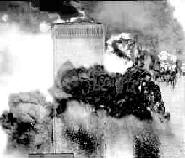 But violence is never enough to create security, and certainly never leads to lasting peace. Violence begets more violence and retribution. So while an appropriate response may include violence it must also include a level of Western, particularly U.S. introspection and at least a sizable portion of active citizens examining what role we played in creating such hatred against our country. It is obvious that the responsibility for Sep 11 rest with those who planned and executed the acts of horror. If the 19 men of Arab heritage had not hijacked the planes and crashed them into the WTC towers the disaster would not have happened. Yet they had reasons for their actions, and to fully address and appropriately respond to the crisis at hand we must delve into, take serious and dare I say, legitimate their reasons. It is crucial to remember that reasons are not excuses. We cannot excuse nor wholly accept these horrid acts of violence as understandable. Anyone who is directly responsible for such acts must be held accountable. But if we wish to move pass the crisis rather than repress it and in the process plant more seeds of hate, we in the United States must have a full and open discussion as to why September 11, 2001 happened.
But violence is never enough to create security, and certainly never leads to lasting peace. Violence begets more violence and retribution. So while an appropriate response may include violence it must also include a level of Western, particularly U.S. introspection and at least a sizable portion of active citizens examining what role we played in creating such hatred against our country. It is obvious that the responsibility for Sep 11 rest with those who planned and executed the acts of horror. If the 19 men of Arab heritage had not hijacked the planes and crashed them into the WTC towers the disaster would not have happened. Yet they had reasons for their actions, and to fully address and appropriately respond to the crisis at hand we must delve into, take serious and dare I say, legitimate their reasons. It is crucial to remember that reasons are not excuses. We cannot excuse nor wholly accept these horrid acts of violence as understandable. Anyone who is directly responsible for such acts must be held accountable. But if we wish to move pass the crisis rather than repress it and in the process plant more seeds of hate, we in the United States must have a full and open discussion as to why September 11, 2001 happened.
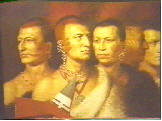 Unfortunately the dominant socioeconomic paradigm does not allow for a full debate with all the possible spectrum of viewpoints. Those who wish to examine the role of United States’ foreign policy in motivating the September 11th attacks are labeled as traitors and abettors to the enemy. Critiques of the U.S. are dismissed as attempts to pull America down. It is said that the country needs unity now not discourse. This is a by-product of our unwillingness to be truthful with ourselves about ourselves. Our nation, my country continues to ignore the evils that are a part of our past and present. This will not allow us to acknowledge as a nation our role in the creation of such men who saw and see so little value in U.S. citizens’ lives. We live in our myth of a righteous and pure America rather than in the reality of a human America with human weaknesses, vulnerabilities and frailties. We are taught that good and evil are separate and apart from each other when in fact they live within each of us and many times speak and act through us. This clouding of truth and the entanglement of good and evil are evident in our national response to Sep 11. The first clouding of truth is our shock at such an act of violence. We cannot fathom how someone can plot to kill so many non-combatants thus the "innocent," no matter the grievance. We fail to remember in our myth of good America that our history is replete with the killing of non-combatants thus the "innocent." Examples from our early history are the near genocide of First Nation people and the enslavement of Africans; Nagasaki, Hiroshima and Vietnam from recent history, and Iraq and Serbia in our present.
Many would argue that these moments in our history are in the dim past and play no role in our present day national character or the near and present day examples are justifiable and do not stain our national virtue. While these arguments have validity they do not wash away the suffering and horrors imposed on the victims of manifest destiny, slavery and war. They also do not recognize the paradox of good and evil present together as one. The escape of the oppressed and persecuted from Europe to the Western hemisphere was an epic and magnificent event. But the new comers systematic ethnic cleansing of native peoples and conquest of a land not entirely theirs was evil. The creation of the United States, the first constitutional republic by what may well be the most important political document in history is a tribute to the human struggle for freedom, and should be heralded and celebrated. But the socioeconomic vehicle of slavery used to cement this union was unholy.
Fast forward to a time not so long ago, remembered by many people living today. Let us examine our heroic role as the arsenal for democracy and the saviors of the free world. My statement is not intended as a cynical description of the U.S. in WW II. United States' citizens can and should hold their heads high as we remember the lives lost and the sacrifices suffered to rid the world of Nazism, Fascism and rampant nationalism. Yet if we are truthful with ourselves our confidence will be tempered and reflective as we also remember Jim Crow, lynching, U.S. anti-Semitism, virulent sexism, Japanese-American internment camps and McCarthyism. The war waged while necessary was not without its "collateral damage." The bombing of Berlin to shambles to break the spirit of the German people surely killed more than the "guilty."
With the backdrop of the recent enormous loss of civilian life on U.S. soil, one event during this period in our history deserves particular attention. As stated before, we ask, is such horror ever justified? Of course the answer is no. Yet we found justification to drop atomic bombs on two Japanese cities, causing damage well beyond the destruction of several World Trade Center complexes. Estimated deaths caused by the nuclear explosions, 105,000 and 94,000 injured, most if not all-civilian non-combatants, thus “innocents.”
Unfortunately the dominant socioeconomic paradigm does not allow for a full debate with all the possible spectrum of viewpoints. Those who wish to examine the role of United States’ foreign policy in motivating the September 11th attacks are labeled as traitors and abettors to the enemy. Critiques of the U.S. are dismissed as attempts to pull America down. It is said that the country needs unity now not discourse. This is a by-product of our unwillingness to be truthful with ourselves about ourselves. Our nation, my country continues to ignore the evils that are a part of our past and present. This will not allow us to acknowledge as a nation our role in the creation of such men who saw and see so little value in U.S. citizens’ lives. We live in our myth of a righteous and pure America rather than in the reality of a human America with human weaknesses, vulnerabilities and frailties. We are taught that good and evil are separate and apart from each other when in fact they live within each of us and many times speak and act through us. This clouding of truth and the entanglement of good and evil are evident in our national response to Sep 11. The first clouding of truth is our shock at such an act of violence. We cannot fathom how someone can plot to kill so many non-combatants thus the "innocent," no matter the grievance. We fail to remember in our myth of good America that our history is replete with the killing of non-combatants thus the "innocent." Examples from our early history are the near genocide of First Nation people and the enslavement of Africans; Nagasaki, Hiroshima and Vietnam from recent history, and Iraq and Serbia in our present.
Many would argue that these moments in our history are in the dim past and play no role in our present day national character or the near and present day examples are justifiable and do not stain our national virtue. While these arguments have validity they do not wash away the suffering and horrors imposed on the victims of manifest destiny, slavery and war. They also do not recognize the paradox of good and evil present together as one. The escape of the oppressed and persecuted from Europe to the Western hemisphere was an epic and magnificent event. But the new comers systematic ethnic cleansing of native peoples and conquest of a land not entirely theirs was evil. The creation of the United States, the first constitutional republic by what may well be the most important political document in history is a tribute to the human struggle for freedom, and should be heralded and celebrated. But the socioeconomic vehicle of slavery used to cement this union was unholy.
Fast forward to a time not so long ago, remembered by many people living today. Let us examine our heroic role as the arsenal for democracy and the saviors of the free world. My statement is not intended as a cynical description of the U.S. in WW II. United States' citizens can and should hold their heads high as we remember the lives lost and the sacrifices suffered to rid the world of Nazism, Fascism and rampant nationalism. Yet if we are truthful with ourselves our confidence will be tempered and reflective as we also remember Jim Crow, lynching, U.S. anti-Semitism, virulent sexism, Japanese-American internment camps and McCarthyism. The war waged while necessary was not without its "collateral damage." The bombing of Berlin to shambles to break the spirit of the German people surely killed more than the "guilty."
With the backdrop of the recent enormous loss of civilian life on U.S. soil, one event during this period in our history deserves particular attention. As stated before, we ask, is such horror ever justified? Of course the answer is no. Yet we found justification to drop atomic bombs on two Japanese cities, causing damage well beyond the destruction of several World Trade Center complexes. Estimated deaths caused by the nuclear explosions, 105,000 and 94,000 injured, most if not all-civilian non-combatants, thus “innocents.”
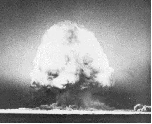 Paul Fussell's 1981 essay, Thank God For The Atomic Bomb discussed among other things, what U. S. soldiers on their way to invade Japan might have been thinking as they neared the islands. It was estimated that Allied casualties would surpass one million to force the Japanese to surrender the home islands Kyushu and Honshu. I do not fault those brave men and women soldiers if they wished a cataclysmic event to befall their enemies, so that they would be sure to return home and see their families again. No I cannot. I felt those same emotions before the U.S. attack on Iraq. I hugged my wife, said goodbye to my son, sisters and mother thinking I may never return home. I counted on the U.S. willingness to use tactical nuclear weapons to stop Saddam from using bio, chemical or nuclear weapons against me. I am familiar with the fear of dying in a foreign land.
Once again good and evil commingling speaks together. It was good that the United States ended WWII, saved American lives and stopped the Japanese slaughter of Chinese. But the use of weapons of mass destruction is a kind of evil.
And then there is the most horrific vision of all. The apocalyptic M.A.D. (Mutually Assured Destruction) strategy was the accepted policy to ensure the survival of our way of life and a free world. The United States had in place plans that could have led to the “end of the world as we know it.” Was world obliteration the appropriate response to first strike Soviet aggression against the United States? Of course the Soviet paranoia and obvious design to control much of Europe and parts of Asia had to be held in check. But world annihilation as an acceptable outcome to ensure Soviet defeat has a ring of madness. The possibility is evil. The deaths at the WTC are insignificant when compared to the deaths of billions.
Paul Fussell's 1981 essay, Thank God For The Atomic Bomb discussed among other things, what U. S. soldiers on their way to invade Japan might have been thinking as they neared the islands. It was estimated that Allied casualties would surpass one million to force the Japanese to surrender the home islands Kyushu and Honshu. I do not fault those brave men and women soldiers if they wished a cataclysmic event to befall their enemies, so that they would be sure to return home and see their families again. No I cannot. I felt those same emotions before the U.S. attack on Iraq. I hugged my wife, said goodbye to my son, sisters and mother thinking I may never return home. I counted on the U.S. willingness to use tactical nuclear weapons to stop Saddam from using bio, chemical or nuclear weapons against me. I am familiar with the fear of dying in a foreign land.
Once again good and evil commingling speaks together. It was good that the United States ended WWII, saved American lives and stopped the Japanese slaughter of Chinese. But the use of weapons of mass destruction is a kind of evil.
And then there is the most horrific vision of all. The apocalyptic M.A.D. (Mutually Assured Destruction) strategy was the accepted policy to ensure the survival of our way of life and a free world. The United States had in place plans that could have led to the “end of the world as we know it.” Was world obliteration the appropriate response to first strike Soviet aggression against the United States? Of course the Soviet paranoia and obvious design to control much of Europe and parts of Asia had to be held in check. But world annihilation as an acceptable outcome to ensure Soviet defeat has a ring of madness. The possibility is evil. The deaths at the WTC are insignificant when compared to the deaths of billions.
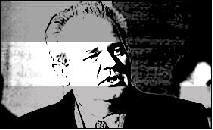 The disintegration of Yugoslavia into ethnic enclaves is too complex for those with passing interest to understand. There are no clear good and bad guys. But it was clear before the U.S. led effort to stop Slobodan Milosevic’s aggression towards non-ethnic Serbs that too many innocent people were suffering and dying in the fighting. At the onset the U.S. did not want to take the lead in managing the conflict because the issue did not firmly fit in our view of national interest. We preferred that the European powers handle their own problems. In time we learned that they either could not or would not, so we found ourselves heading a coalition to execute an air war against Serbia. It was good that the U.S. led efforts to stop the ethnic cleansing motivated by Serbian radical nationalism espoused by Milosevic. His motives and methods were reminiscent of Nazism. But the merciless bombing of Serbian cities clearly was not all good. The NATO forces also made horrendous mistakes. The bombing of civilian convoys and the Chinese embassy killed noncombatants thus the "innocent." And while the U.S. intervened in an Eastern Europe conflict where tens of thousands had died, we sat idle as hundreds of thousands of Hutus and Tutsis killed each other in Rwanda. Many easily find evil in that lack of intervention.
The disintegration of Yugoslavia into ethnic enclaves is too complex for those with passing interest to understand. There are no clear good and bad guys. But it was clear before the U.S. led effort to stop Slobodan Milosevic’s aggression towards non-ethnic Serbs that too many innocent people were suffering and dying in the fighting. At the onset the U.S. did not want to take the lead in managing the conflict because the issue did not firmly fit in our view of national interest. We preferred that the European powers handle their own problems. In time we learned that they either could not or would not, so we found ourselves heading a coalition to execute an air war against Serbia. It was good that the U.S. led efforts to stop the ethnic cleansing motivated by Serbian radical nationalism espoused by Milosevic. His motives and methods were reminiscent of Nazism. But the merciless bombing of Serbian cities clearly was not all good. The NATO forces also made horrendous mistakes. The bombing of civilian convoys and the Chinese embassy killed noncombatants thus the "innocent." And while the U.S. intervened in an Eastern Europe conflict where tens of thousands had died, we sat idle as hundreds of thousands of Hutus and Tutsis killed each other in Rwanda. Many easily find evil in that lack of intervention.
 In the world of geopolitical chess there is much unsavory maneuvering that many would argue is necessary to protect national interest, but to distinguish between the good and the evil a line of morale principal must be held. The Gulf War found the United States facing Iraq, an enemy we had earlier supported in its war against Iran. The U.S. support of Saddam had no moral foundation. Our actions were based on pure national interest as conceived by men who believe the ends justify the means. In fact the Iran Contra scandal uncovered the U.S. also helping Iran in their war effort against Iraq. Playing both sides and supporting leaders who send tens of thousands to die in a war that once at end benefited the U.S. more than either warring state. Is this reasoning and morality any saner than that of the WTC attackers?
The U.S. action to check Iraq's aggression against Kuwait and stop Saddam’s development of nuclear and biochemical weapons was necessary. Hussein’s conduct in the region was so outrageous that he alienated his natural allies: Arabs and Muslims, and forced them into the arms of the West and Israel. Saddam’s vision for Iraq is tyranny. But the continued economic sanctions against the people of Iraq are not justifiable. According to a U.N. report the sanctions have contributed to the death of 500,000 children. Children are the definition of innocent. Can there not be a measure of evil in our actions no matter how small or indirect our complicity when so many children have died?
In the world of geopolitical chess there is much unsavory maneuvering that many would argue is necessary to protect national interest, but to distinguish between the good and the evil a line of morale principal must be held. The Gulf War found the United States facing Iraq, an enemy we had earlier supported in its war against Iran. The U.S. support of Saddam had no moral foundation. Our actions were based on pure national interest as conceived by men who believe the ends justify the means. In fact the Iran Contra scandal uncovered the U.S. also helping Iran in their war effort against Iraq. Playing both sides and supporting leaders who send tens of thousands to die in a war that once at end benefited the U.S. more than either warring state. Is this reasoning and morality any saner than that of the WTC attackers?
The U.S. action to check Iraq's aggression against Kuwait and stop Saddam’s development of nuclear and biochemical weapons was necessary. Hussein’s conduct in the region was so outrageous that he alienated his natural allies: Arabs and Muslims, and forced them into the arms of the West and Israel. Saddam’s vision for Iraq is tyranny. But the continued economic sanctions against the people of Iraq are not justifiable. According to a U.N. report the sanctions have contributed to the death of 500,000 children. Children are the definition of innocent. Can there not be a measure of evil in our actions no matter how small or indirect our complicity when so many children have died?
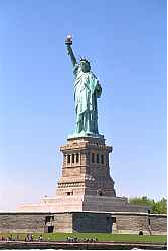 What may well be the most immediate clouding of truth is the lie of our everyday lives. We are the richest country in the world yet there are portions of major cities and rural areas with poverty rates rivaling the poorest countries. We have the best health care system in the world, yet we deny access to a significant number of our citizens. Violence is a way of life in the United States. According to the FBI Uniform Crime Report over 1,400,000 violent crimes were committed in the United States in 1999. The National Crime a
nd Victimization Survey of the same year reported over 7 million victims of those violent crimes. Amadou Diallo, Abner Louima, James Byrd, Mathew Shepard, church burnings, clinic bombings and blaming my GLBT brothers and sisters for Sep 11th are a few of the many daily horrors we inflict upon each other, citizen to citizen. Are we naive enough to believe that as the populace of the most powerful nation in the world, our need to exact violence towards each other does not show itself in our actions towards people in other nations?
Please do not misunderstand my intention nor take my words out of context. I do not wish to label my country evil. To call the United States evil is to ignore the good works, enormous contributions, and vision of freedom we have given the world. But to claim American virtue unsoiled by its many horrible acts in the name of national interest is to tell an evil lie. A lie that will not serve the nation well as we move deeper into a new millennium and look for ways to live on an increasingly shrinking globe with other world citizens in mutual respect.
We must be truthful with ourselves to see that in our zeal to punish Asama bin Laden we have condoned the evil of killing the innocent. We must be truthful with ourselves as we craft our policies in the war against terrorism, so that we can lessen the evil that will accompany the good of containing a system that would force us to live in a theocracy. Fascist fundamentalism be it Islamic, Christian, Jewish or any other belief system must be held at bay or vanquished when possible. But justice demands freedom replace fascism and the interest of humanity replace national interest. The world is now a global village. We can no longer pretend what happens in far off lands will not affect us.
What may well be the most immediate clouding of truth is the lie of our everyday lives. We are the richest country in the world yet there are portions of major cities and rural areas with poverty rates rivaling the poorest countries. We have the best health care system in the world, yet we deny access to a significant number of our citizens. Violence is a way of life in the United States. According to the FBI Uniform Crime Report over 1,400,000 violent crimes were committed in the United States in 1999. The National Crime a
nd Victimization Survey of the same year reported over 7 million victims of those violent crimes. Amadou Diallo, Abner Louima, James Byrd, Mathew Shepard, church burnings, clinic bombings and blaming my GLBT brothers and sisters for Sep 11th are a few of the many daily horrors we inflict upon each other, citizen to citizen. Are we naive enough to believe that as the populace of the most powerful nation in the world, our need to exact violence towards each other does not show itself in our actions towards people in other nations?
Please do not misunderstand my intention nor take my words out of context. I do not wish to label my country evil. To call the United States evil is to ignore the good works, enormous contributions, and vision of freedom we have given the world. But to claim American virtue unsoiled by its many horrible acts in the name of national interest is to tell an evil lie. A lie that will not serve the nation well as we move deeper into a new millennium and look for ways to live on an increasingly shrinking globe with other world citizens in mutual respect.
We must be truthful with ourselves to see that in our zeal to punish Asama bin Laden we have condoned the evil of killing the innocent. We must be truthful with ourselves as we craft our policies in the war against terrorism, so that we can lessen the evil that will accompany the good of containing a system that would force us to live in a theocracy. Fascist fundamentalism be it Islamic, Christian, Jewish or any other belief system must be held at bay or vanquished when possible. But justice demands freedom replace fascism and the interest of humanity replace national interest. The world is now a global village. We can no longer pretend what happens in far off lands will not affect us.
 I love this nation. I love it dearly. It has afforded me great opportunity, comfort and confidence as a world citizen. But I love my family and the earth more. And while I am willing to die in defense of freedom, I will not die in defense of a myth. To be the land of the free and home of the brave we must take all peoples' freedom serious. We must begin to see all citizens of the world as Americans or we run the risk of destroying our own freedom and finally ourselves.
I love this nation. I love it dearly. It has afforded me great opportunity, comfort and confidence as a world citizen. But I love my family and the earth more. And while I am willing to die in defense of freedom, I will not die in defense of a myth. To be the land of the free and home of the brave we must take all peoples' freedom serious. We must begin to see all citizens of the world as Americans or we run the risk of destroying our own freedom and finally ourselves.